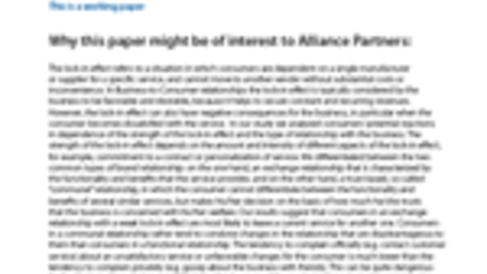
The August 2014 Paper on 'The Business-to-Consumer Lock-in Effect' by Markus Eurich and Michael Burtscher
The lock-in effect refers to a situation in which consumers are dependent on a single manufacturer or supplier for a specific service, and cannot move to another vendor without substantial costs or inconvenience. In Business-to-Consumer relationships the lock-in effect is typically considered by the business to be favorable and desirable, because it helps to secure constant and recurring revenues. Therefore, it is frequently integrated into the logic of how a business creates value and generates revenues. However, the lock-in effect can also have negative consequences for the business, in particular when the consumer becomes dissatisfied with the service. In this case, the brand value and reputation may suffer and consumers may leave one service for another. In our study we analyzed consumers’ potential reactions in dependence of the strength of the lock-in effect and the type of relationship with the business.
